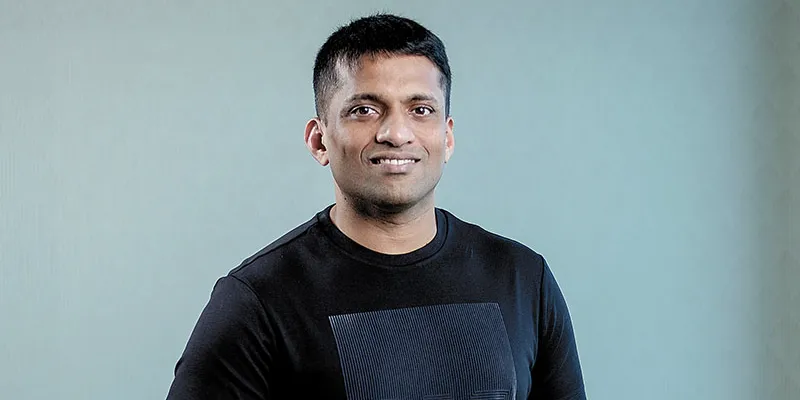Here’s why and when Byju’s may go public
Byju’s Founder and CEO Byju Raveendran said it’s an 'aspiration' for him to build a large public company out of India.

Byju's Founder and CEO Byju Raveendran
India’s largest online learning startup may go public in the next two to three years by listing itself on stock exchanges both in India and the US. Although the Bengaluru-based edtech unicorn (startups with billion-dollar valuations) is yet to freeze on an exact timeline for the IPO (initial public offering), Byju’s Founder and CEO Byju Raveendran said that it’s possible in the next two to three years, and that it’s an “aspiration” for him to build a large public company out of India.
“If you are expecting a timeline (for the IPO), I myself haven’t thought seriously about it -- maybe like two years, three years, maybe longer,” he told YourStory Founder and CEO Shradha Sharma during a recent chat.
Despite the exact timeline still being a little hazy, an IPO is definitely on the cards and is likely to happen sooner rather than later.
“That (IPO) will be a clear option because we have a profitable model. That’ll be an option available to us sooner than later. To be very honest, I haven’t thought of the timeline, whether it’s two years, three years. Once we decide, I am sure we can do that in 24-36 months,” Byju said. The nine-year-old startup turned profitable last year.
Watch the full conversation here:
Started in 2011 by teacher-turned-entrepreneur Byju, the edtech platform provides online learning classes for kindergarten to Class 12 students, along with training for entrance tests to engineering colleges, medical colleges, and the civil services. It is currently India’s second most valuable startup after payments startup Paytm, which is valued at $16 billion. During its last fundraise in June, Byju’s was valued at $10.5 billion.
Byju’s is one of the most-funded education startups in the world, having raised around $1.6 billion through 16 funding rounds. Its marquee investors include Facebook Co-founder and CEO Mark Zuckerberg, China’s Tencent, South African private equity firm Naspers, and Silicon Valley venture capitalist Mary Meeker’s Bond Capital.
Commenting on how Byju’s attracted such top-notch investors, the 39-year-old self-made billionaire, who grew up in the coastal village of Azhikode in Kerala, where his parents were school teachers, said: “That’s a function of I’ll say -- the model is mature enough to attract high-quality investors, long-term, patient investors. It’s a diverse portfolio of global investors. For a lot of them, it’s their first investment in India, they are attracting more and more investors to look at India, and for a good number of them, it’s their first investment in India.
“For some of them, it’s their first investment in education so that way we are getting more and more capital into India, and showing that there is so much growth that you will see in India over the next few years.”
There has been a buzz about several other unicorns from India looking at going public over the next couple of years, and word on the Street is that it has more to do with their investors seeking exits rather than the startups wanting to do an IPO.
However, Byju clarified that is not the case with the edtech company at all. ‘We don’t need to do that (IPO) to give exit to the early investors,” he said, adding that the company has always had more “buyers than sellers.”
Successful IPOs from the India startup ecosystem over the years include , (parent of Naukri.com, JeevanSathi.com, , and Shiksha.com), , Quick Heal, and more recently, .
“Now that’s an aspiration -- creating a large public company, coming out of India. We’ll have an option to list in the US, as well as in India, because we are an India-based company,” Byju said.
was the last Indian startup to list on the Nasdaq (National Association of Securities Dealers Automated Quotations) in 2010. Located in New York City, Nasdaq is the second-largest (by market capitalisation of shares traded) stock exchange in the world after the New York Stock Exchange (NYSE).









